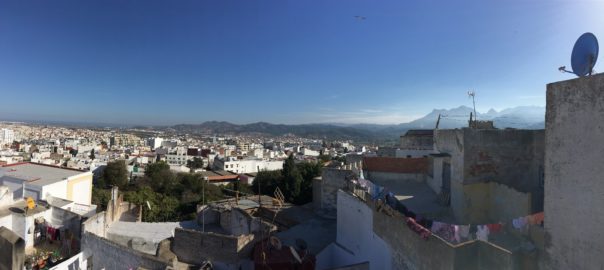Between 20-24 November 2017, two members of the TMC team were delighted to participate in the 3rd edition of the International Film School Festival (FIDEC) in Tetouan. Flo Martin was invited as a member of the festival’s jury – working alongside filmmakers Farida Benlyazid and Ghassan Salhab and Dr. Walid El Khabach – whilst Will Higbee attended the festival and took part in a panel with members of the London Film School (partners of the TMC project, who were also receiving a special award at this year’s festival).
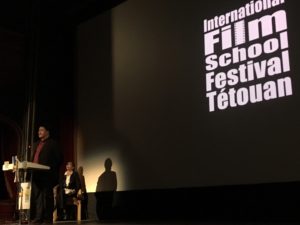
Now in its third year, the organisers of FIDEC selected more than 30 shorts from film schools in over 17 countries (including Mali, Lebanon, Austria, Mexico, Belgium, Qatar, Finland the UK and, of course Morocco) to compete in this year’s competition. It was especially pleasing to see a strong number of African filmmakers represented at the festival – an indication that the ‘south-south’ collaboration between Moroccan cinema and Sub-Saharan Africa, visible in the production initiatives currently promoted by the CCM, is also successfully operating among budding African filmmakers. The quality of films in competition was generally high, drawing on a broad range of narrative and documentary film, as well as animation and experimental film art from a truly international array of film schools from across the globe.
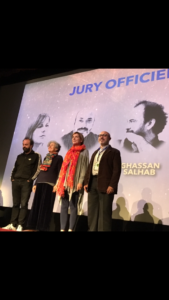
As a member of the festival jury, Flo’s take on the range of films at the festival is largely reflected in the various prizes awarded by the jury (for more information see here). For Will, speaking independently of the jury, particular highlights from the films in competition included: La Saison du Silence, Tizian Büchi’s beautifully observed study of life in a remote French farming community – a documentary that brings slow cinema to the Haut-Jura; Les Colombes inquiètes, a documentary by Zeynep Danisman that fearlessly combines the personal and political to powerful effect in exposing the ongoing human rights violations that lead to the political assassination of Armenian journalist Hrant Dink in Turkey in 2007 and continue to be felt today ; Hombre negro sin identificar, Javier Extremera’s harrowing but highly original take (particularly in its use of sound and image) on the personal cost for young African men caught up in Europe’s migrant crisis and, finally, Welcome, an assured and taut fiction film by Balázs Dudás (part social realist drama, part thriller) that explores the effect on a young Hungarian man of his involvement in the illegal trafficking of immigrants into ‘Fortress Europe’. This selection of films, as indeed most films programmed at the festival, clearly showed that many in this new generation of filmmakers focus on issues of migration, human rights, and on the inequalities (and real human cost) created by neo-liberal globalization.
Of note also, two Moroccan documentaries by students: Fayrouz: day of Glory, an engaging portrait of a Moroccan schoolteacher in a small village who is active in street theatre and harbours ambitions to swap teaching for a career on stage and screen, and Le Jeune homme et la mer, a documentary about a fisherman, that employed state-of-the-art digital camera technology to stunning visual effect in its underwater photography. Both these films were very well received by the jury and the festival audience.
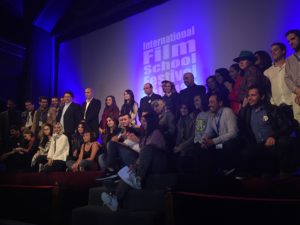
In addition to the films in competition, the festival programme included a series of short film programmes celebrating the rich history of the London Film School and that of Le Fresnoy, the French national studio of contemporary art that celebrated its 20th anniversary in 2017. Also included was a section entitled ‘DocsTetouan’: a special selection of films produced by students studying on the Documentary Filmmaking Masters at Tetouan, which illustrated the strength of Moroccan documentary talent emerging from this film practice programme.
Running alongside its screenings, the festival also brought together students, filmmakers and researchers for a series of masterclasses at the School of Arts and Humanities, Tetouan University – where the Masters programme in documentary cinema is led by Prof. Hamid Aidouni, the festival director and a key figure in the cultural and cinematic life of Tetouan. This year the festival masterclasses offered a range of experiences and perspectives from Michel Serceau – French researcher, educator, festival organizer, and author of numerous key publications on the language of film, authorship and (of course) Arab cinema; Egyptian director Sayed Said and Lebanese screenwriter, director and producer, Ghassan Salhab who both who provided insights into their respective filmmaking practices. For me, the highlight was the masterclass delivered by Ghassan Salhab, who eloquently and passionately explored the personal and wider artistic impulses at work in his latest film, L’encre de chine – a powerful, poetic visual essay on questions of space and identity. Prompted by the threat of immanent eviction from his current apartment in Beirut, Ghassan used his film to re-visit locations with an intense personal significance for the filmmaker/artist and to explore his own mixed heritage as the son of Lebanese parents who grew up in Senegal. The argument put forward by Ghassan is that ‘place’ is as important for understanding who we are as the over-exposed and often over-generalized concept of ‘identity’. The audience at the masterclass were fortunate to view advanced excerpts from the film still in the process of being edited. Though he had previously directed feature films with far larger budgets, and involving a cast and crew of scores of individuals, Ghassan chose to shoot his most recent film on his iPhone and edit it on his laptop. He shared with the audience the good news that the distribution rights for the film had been acquired by Franco-German TV channel Arte on the very morning of the masterclass! His message to the students was therefore a direct and inspiring one: with creativity, commitment and drive, it is possible to make the film you want. The technological means to do so have never been more accessible.
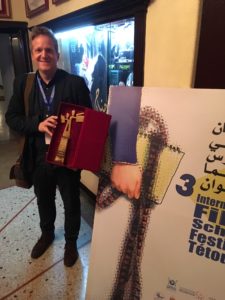
Finally, running alongside the masterclasses were sessions with representatives from Le Fresnoy and the London Film School (official partners of the TMC project). Participants in the LFS panel discussed the structure, educational strategy and film education philosophy of the LFS in relation to the various programmes in Filmmaking, Screenwriting, International Film Business and PhD in Film Practice offered at the School. The panel included: Gisli Snaer, director of studies at the LFS, Dr Jamie Chambers and Aegina Brahim – both LFS graduates whose recent films were screened at the festival – and Prof Will Higbee (PI of the TMC project and academic lead for the Exeter – LFS partnership). This was the first, and we hope not the last, official collaboration between FIDEC, the faculty at Tetouan and the London Film School. LFS Director of Studies, Gisli Snaer, was impressed with what he saw at both the faculty and the festival – and has proposed that the LFS nominate the MA in Documentary Filmmaking programme led by Prof. Hamid Aidouni for membership of CILECT (the International Association of Film and Television Schools).
On behalf of the TMC project, Flo Martin and Will Higbee would like to thank the entire organisational team from FIDEC, and colleagues at the Faculty of Arts and Humanities, Tetouan University for the welcome they extended to Flo and Will, as well as colleagues from the LFS for this high-quality festival. Above all, we would also like to acknowledge the talent and vision of Professor Hamid Aidouni, the driving force behind FIDEC. We very much hope to return for the 4th edition of the festival later this year.
Will Higbee
